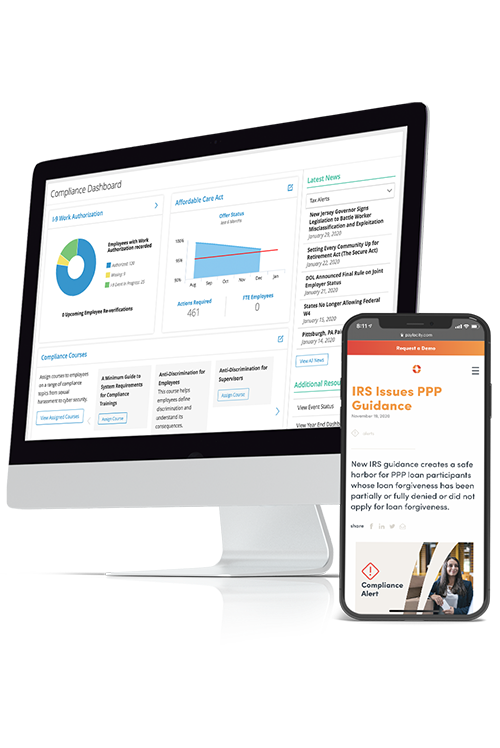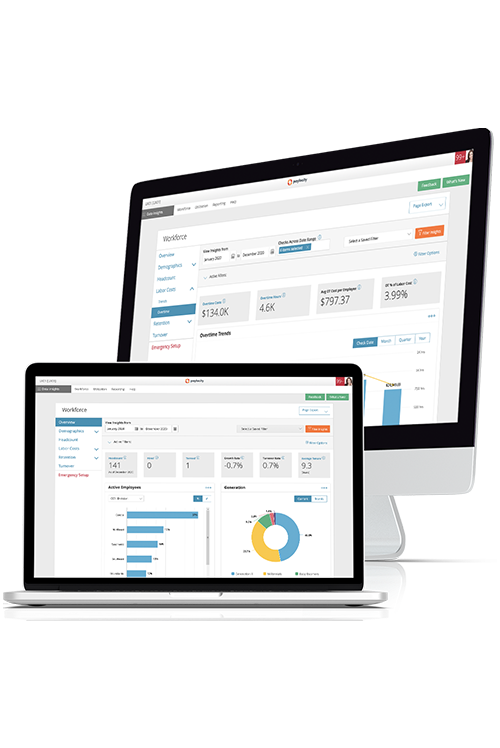Related Learning

The Truth About Pay Compression
Pay compression is nothing new for HR professionals. But we’ve certainly seen it exacerbated over the last few years.
In the wake of the pandemic and a slew of complex employment trends, many companies have had to increase salaries to attract the best talent. Even now, amid news of large layoffs, the labor market remains fiercely competitive for many high-demand skills. It may be no surprise that compensation costs for civilian workers increased 5.1% in 2022, compared to 4.5% in 2021, with service occupations increasing 6.9%.
Have salaries for tenured employees kept up?
When you assess your workforce, it’s not uncommon to discover some differentiation in pay based on factors like skills, education, tenure, and performance. The issue occurs when there are pay similarities where there shouldn’t be.
Key Takeaways
- Pay compression occurs when there is little to no variation in compensation between employees with different qualifications, abilities, and experience.
- The top five causes of pay compression are: irregular salary adjustments, a rise in starting salaries, salary range limits, merit-based pay inequities, and labor market shifts.
- To prevent pay compression, carry out regular pay audits and investigate wage levels when recruiting new staff to ensure base salaries are competitive.
What Is Pay Compression?
Pay compression, also known as wage compression or salary compression, describes a situation where there is little to no difference in pay between employees with different levels of experience, skills, and qualifications.
As HR and payroll professionals know, managing compensation is an ongoing, complex process and a key part of your talent management strategy. Compensation includes more than a base salary, but let’s be honest — people want to get paid what they are worth.
Although pay compression can happen subtly over time, it often occurs when organizations increase starting salaries to attract talent without adjusting the wages of existing employees, so that the difference in pay between a new hire and a tenured employee is compressed.
Is Pay Compression Illegal?
Pay compression isn’t illegal, but it can have devastating effects on employee morale and job satisfaction — which in turn impacts talent acquisition, retention, and productivity. And while there is no legislation that explicitly prohibits pay compression, keep in mind there are several laws against compensation discrimination.
Is Pay Compression a Problem?
It can be, for one big reason: Employees talk to each other. Pay conversations are protected by the National Labor Relations Act (NLRA), which grants employees the right to communicate with other employees at their workplace about their wages. Further, in recent years, co-worker socialization around pay has changed as pay transparency becomes more common.
What Causes Pay Compression?
Pay compression often happens unintentionally and sometimes even for a good reason. Companies experiencing high growth, which is generally a good thing, may have to fill many openings quickly. If you’re in a competitive labor market, though, this can lead to inflated starting salaries.
The top five causes of pay compression are:
- Lack of regular salary adjustments — when employees’ salaries are not adjusted to reflect inflation, market trends, or increased experience and skills.
- Higher starting salaries — when new hires are offered a salary that is almost the same as current employees who have seniority.
- Limited salary ranges — some organizations have pay caps for certain positions, which can lead to compression when employees at different levels hit the cap.
- Merit-based pay systems — if a merit system isn’t structured well, high-performing employees sometimes get short-changed.
- Shifting market conditions — there are several ways market conditions can impact compensation; for example, a business may not feel the need to reward loyal employees if there is an oversupply of labor.
Unfortunately, when you dig into your compensation data, you may discover that compression has occurred due to inconsistent pay practices over time. Data might also highlight unintentional biases such as compensation trends for gender, age, or race.
In HR, we’re used to seeing movement in early career roles, when people change jobs and employers for a salary increase. Today, we’re seeing movement at all levels because there’s high demand and more opportunity.
A company may have to decide whether to grow its existing employees through training and career advancement or increase compensation to bring in the necessary talent. The cost might be a wash, but you could lose the experience of a loyal employee.
How to Identify Pay Compression in Your Organization
When you find a discrepancy that you can’t fully speak to, consider how you got there. Did you have to increase entry-level salaries to fill open positions but were unable to raise the salaries of current employees? Do you have a higher turnover rate of senior-level employees because compensation increases haven’t kept pace with the talent market?
There are many ways to look at compensation data, but here are six indicators of pay compression to watch for:
- Are there specific roles that are difficult to fill at the historical base pay rate? This could mean you’re due for a market adjustment.
- Are there patterns in salary data that suggest employees at different levels are being paid similar salaries?
- How do your salaries compare to similar organizations in your industry?
- Analyzing your job descriptions, are there similar positions that are earning significantly different salaries?
- Are you losing high performers due to compensation concerns?
- Are performance reviews happening consistently for incumbents, and are they comped accordingly?
It’s essential that HR review compensation with managers since they’re more familiar with individual performance and day-to-day responsibilities. As you evaluate compensation across the organization, consider your talent philosophy and the behaviors you’re trying to drive. For example, does your company value continuous skill improvement and innovation, and how do you reward employees who achieve this?
Finally, the best way to find out if pay compression is having a negative impact on your employees is to ask them. Conduct surveys to learn if workers believe they are paid fairly, if they feel pay compression is an issue, and their overall level of job satisfaction.
As with most human resource challenges, it comes down to knowing your people, your business, and your budget.
What Does Compression Say About Your Compensation Strategy?
Hear more about how pay strategies and approaches impact pay compression in our webinar, Pay Compression: What You Need to Know — and Fix.
I Found Pay Compression. How Do I Fix It?
If you uncover pay compression in your organization, you’re not alone. Research by Robert Half found that 56% of C-suite executives have observed salary discrepancies between new hires and more tenured staff.
Now you need to decide when and how you’ll address any wage gaps. Can you make a one-time adjustment? Are promotions or merit pay warranted? Organizations often tie these adjustments to the performance review schedule, but you also need to consider how you will prevent pay compression in the future.
Prioritizing Urgent Pay Gaps
The first step is addressing any compensation issues that have an immediate impact on the business. For example, if you’re struggling to fill critical positions, you may need to make a market adjustment for that job family — increasing the starting wage to be competitive while also adjusting tenured employees’ compensation as appropriate.
Of course, if HR could grant everyone raises, we probably would. But the solution to pay compression is usually more complicated, which means you’ll have to engage with these key partners:
- Finance — with pay ranges and salary baselines in hand, discuss what options are realistic for your budget. Is this a new initiative? How can you budget to prevent pay compression going forward?
- Department Stakeholders — review compensation data with managers to ensure their team pay structure makes sense. What is the impact of pay compression on performance, and how quickly do you need to address it?
- Senior Leaders — be prepared to tell the story to your executives. How did these instances of pay compression occur, what are the current or anticipated consequences, and what are your recommended steps to correct them?
Remember, employees talk to each other about their compensation and working conditions. It’s always better that they hear about change from you first. We have some words of advice about communicating with employees below.
Preventing Pay Compression Long-Term
If you find acute instances of pay compression, you are going to want to address them sooner rather than later. Then, you want to make sure it doesn’t creep up on you again by examining your compensation policies and processes in depth.
If regular compensation audits are not part of your overall talent management process, that’s an excellent place to start. How often you conduct audits will depend on the pace and volume of your hiring and internal movement, including exits. Look for compensation trends within job groupings and make sure pay ranges are being applied consistently.
Do a compensation analysis whenever you’re bringing new talent through the door. This is another continuous but essential process to keep base salaries competitive with the market while also ensuring pay equity for existing employees.
Also, consider your total compensation strategy. Not everyone wants a bigger paycheck (although few would refuse it.) What else can you offer? Some individuals do want cash in their pocket, while others may be more interested in benefits that will pay off in the future. Here again, compensation management software can help you show employees the variety of ways your organization invests in them.
Talking to Employees About Pay Compression
Always assume there’s pay transparency in your company. Not only do employees talk to one another, but they can also research salary information online. Know your employees’ perceptions of the business and address them. Squelch rumors, but make it clear you’re aware of the issue, and you’re taking measures to fix it.
It’s challenging but imperative that you tell the right story to employees. How do your compensation policies and strategies fit their real-life circumstances? If they are struggling to pay the electric bill, they may prioritize a bonus over an opportunity to buy restricted stock units. Help employees see that you are committed to rectifying the situation equitably in a way that meets their needs.
How to Manage Pay Equity Moving Forward
It’s hard — maybe impossible — to predict where world events will take us in the next several years. While pay compression has always been a concern for HR, companies are particularly susceptible to it in a turbulent job market.
When it comes to developing a compensation strategy, having access to human capital analytics will make it easier to drive pay equity across the organization while staying aligned with your budget, especially as work continues to evolve.
Accept that things will change. Like many HR processes, managing compensation is continuously impacted by factors outside our control. That makes it even more important to monitor the factors within our control, like pay compression.
About the Author
Shari Simpson is a seasoned HR pro with 16+ years of experience under her belt. As a multi-talented HR expert, she brings a fresh and veteran perspective to a variety of subjects, from training and development to talent acquisition and employee relations. Shari rocks the mic on a premier HR podcast, where she drops knowledge with other industry legends. Shari is always finding new ways to elevate HR, payroll, and business pros, whether it’s through speaking at national conferences, collaborating with other leaders, or co-leading a women's employee resource group.





